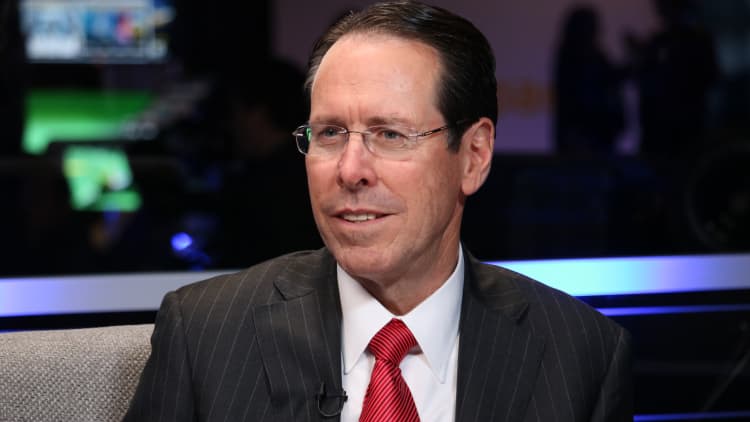AT&T CEO Randall Stephenson announced his retirement Friday, effective July1, 2020. I'm reminded of this "Seinfeld" line: "Kudos, Elaine, on a job....done."
When Stephenson took over AT&T as CEO in May 2007, the company's stock price was $39.47. Today, AT&T trades under $30, about 24% lower. The S&P 500 is up about 85% in the same period.
AT&T is also one of the world's most reliable dividend payers, and the company's dividend has consistently increased since 2007. AT&T pays a quarterly dividend today of $0.52 per share. It was $0.355 back in May 2017. That's a 46% increase.
That perhaps best sums up Stephenson's tenure, which has been notable for its huge bets on acquisitions that have given AT&T sufficient streams of cash flow and potential new revenue streams away from wireless phone business. Still, the deals themselves have been disasters at worst and questionable at best, tarnishing his CEO stint.
"He leaves behind a completely transformed AT&T, but the jury is still out if the transformation is for better or worse," said Craig Moffett, a telecommunications analyst at MoffettNathanson.
Stephenson can't be faulted by sitting on his heels and failing to act. Just the opposite. He's tried to be extremely aggressive with acquisitions throughout his tenure, first trying to buy wireless provider T-Mobile in 2011 for $39 billion, then pivoting to buy DirecTV for $48.5 billion in 2015, and finally landing his biggest blow by purchasing Time Warner for $85 billion in a deal that closed in 2018.
Regulators blocked AT&T's attempt to buy T-Mobile, costing AT&T about $6 billion in cash and spectrum as a breakup fee. That money and AT&T's transferred wireless airwaves helped jump-start T-Mobile into a more robust competitor, which then arguably robbed AT&T of millions of customers in the following years.
AT&T's acquisition of DirecTV has also been a "disaster," according to Moffett, who estimated DirecTV is worth less than half of the near $50 billion AT&T paid for it in 2015. AT&T misjudged the pace of how many satellite TV customers would ditch their traditional pay-TV service for so-called "over the top" internet video options. Stephenson and incoming CEO John Stankey have actually leaned into this in recent years, including rolling out AT&T TV this year, which purposefully eliminates satellite installation. AT&T lost more than 4 million customers from its satellite, wireline and linear streaming-TV services in 2019, from 24.5 million to 20.4 million. Those losses have continued in 2020, announcing another 897,000 premium TV subscriber losses in the first quarter of this year.
Only time will dictate if AT&T's huge purchase of Time Warner will be a success. Stankey has attempted to completely revamp WarnerMedia as its CEO since the acquisition's announcement. Stankey has a grand vision for how AT&T can use HBO Max, WarnerMedia's new streaming service that launches next month, to bolster its own wireless service and help boost AT&T's trading multiple to something that looks more like Netflix's.
But in the midst of doing this, Stankey has effectively forced out many entertainment leaders at HBO and other WarnerMedia divisions. His vision for HBO Max -- "Where HBO Meets So Much More" -- risks diluting the HBO brand over time. HBO has stood for quality programming for decades. And Stankey is now saddled with a legacy TV business which is almost certainly slowly dying as millions of customers cut the cord on cable TV each year.
Stephenson's choice of Stankey as his replacement is "an endorsement of the status quo, for better or for worse," Moffett said. But choosing anyone else would "potentially be catastrophic," given the unfinished moves AT&T has already made.
It's possible Stephenson will be seen as a visionary as the years go by if AT&T outperforms its closest competitor, Verizon, who is planning to spend resources building out a high-speed 5G wireless network instead of buying media assets. But for now, at least, Stephenson departs with a story that's only been partially written and a $200 billion debt load that looms ominously over an economy in dire straits.



